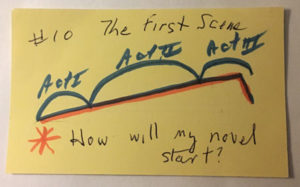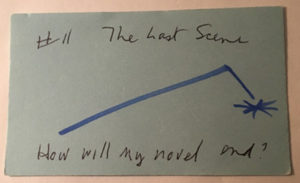 Novel Basics: Card # 10
Novel Basics: Card # 10
The First Scene Card (aka the Hook)
The First Scene Card asks the question,
“How will my novel start?”
Entire books have been written on the importance of the start of your novel. I won’t list any of these books here. But I will say that, above all else, the first scene of a novel must be compelling. It needs to pull your reader into your story, so it’s often called a hook. It also usually introduces the protagonist. Your protagonist, what she wants, her world, just what sort of a person she is, and something of her backstory are the basic subjects for Act 1 of your novel. That’s a lot for you to figure out before you decide where your book starts.
You probably won’t want to start with your protagonist’s birth, Dickens’ masterfully written David Copperfield to the contrary.
Bernard Cornwell begins The Last Kingdom, the first book in his epic Warrior Chronicle series, by telling us that the book (and series) protagonist Uhtred wants back his ancestral lands stolen from him. And then at the bottom of page one, we move right into Uhtred’s account of the day in 866 when his life changed, that is, when he first saw the Danes invading England.
Many beginning writers start with the protagonist waking up in the morning and then take him through the ordinary routine of shower, sh*t and shave. (Actually, I’m quoting from a student’s story.) Believe me. This has been done before, and it hardly ever works. Really you want to start your novel on a day when something different happens.
Now, I realize that the opening to your book might be very vague to you or even absolutely wrong when you first make out this card. In his memoirs Seldom Disappointed Tony Hillerman talks about the drawer he had full of first chapters, that is, false starts to some of his Jim Chee and Joe Leaphorn mysteries. (Wonderful series, one of my all time favorites.)
So for now at least, think of a day in the life of your protagonist when something out of the routine happens or recently happened or that protagonist finds out about. It’s not a business-as-usual moment. It’s the start of something different. Uhtred’s life changes completely when the Vikings arrive in his world.
Think about the start of Harry Potter and the Sorcerer’s Stone, on what was decidedly not an ordinary day. Mr. Dursley sees a cat reading a map and several men wearing brightly colored cloaks. Owls are sighted flying in daylight all over the country. What is going on? Dursley wonders, and so do Rowling’s readers.
Often it’s when the character appears who gets the plot car going. In walks this dame of noir mystery fiction, for instance. The wizard Gandalf arrives in the little Hobbit town to fetch Bilbo Baggins off on an adventure.
Some novels start in medias res, that is, in the middle of things. A crime novel might start with the discovery of the body, for instance, another extraordinary event even for cops.
Card # 11: The Last Scene

The Last Scene Card asks the question,
“How will my novel end?”
By now, you shouldn’t be too surprised that the second scene card you complete gives the answer to the question on the Heart Card for your novel, the answer that you put on the back of your Outcome Card. But here, you can expand on it a bit to include the following options.
Yes, and furthermore . . .
Yes, but . . .
No, and furthermore . . .
No, but . . .
Yes, Cinderella gets her Prince Charming, and furthermore they live happily ever after.
No, Gatsby doesn’t get Daisy and furthermore he’s murdered. But Nick considers him worth more than a whole lot of other people including Daisy Buchanan that Gatsby tried so hard to woo and win.
Because I don’t like to use spoilers when I’m writing about the novels you might read, I’ll make some of my examples for the last scene fairly generic.
In Westerns, the hero, having vanquished the villain in a shoot-out and leaving the girl behind, rides off into the sunset.
In categorical romance novels, the girl and boy might ride off together in the sunset on the same horse.
In epic fantasy, the dragon slain and the treasure retrieved, the hero and his buddies celebrate in a victory feast.
Nick Carraway packs his bags, sells his car, prepares to go back home to the Midwest on the train, and reflects upon the lesson he learned from Gatsby.
In the last scene of One Day in the Life of Ivan Denisovich, the protagonist decides that he’s had a fairly decent day, almost a happy one, one of the 3,653 days in his ten-year stretch in the prison camp, the three extra days being for leap years.
January Jinx, the first book in my Calendar Mystery series, has a yes, but ending. The novel starts with Minty Wilcox on her way to seek employment as a “business girl,” that is, a typist/stenographer, in Kansas City, a place that could downright deadly in 1899. Does she get that job? Okay, I’ll reveal that yes she does. (And furthermore, she meets this really good-looking gent.) But . . . That’s all you get.
Traditionally called the dénouement or unraveling or untying or the clearing up of your plot, the last scene of your book presents the aftermath of the next scene we’ll work on. The last scene ties up any remaining loose ends in the plot, and as is sometimes the case in series fiction, possibly sets up the next book. Do note that sometimes readers complain bitterly about a cliffhanger at the end of a novel, even if you’ve tied up the main plot, but especially if you don’t, so really I can’t advise it.
